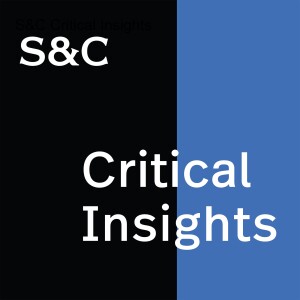Episodes

Wednesday Jul 19, 2023
Supreme Court’s Recent Polansky Decision on the False Claims Act
Wednesday Jul 19, 2023
Wednesday Jul 19, 2023
In this episode of S&C’s Critical Insights, Annie Ostrager and Tracy Richelle High, Co-Heads of S&C’s Labor & Employment Group, discuss the Supreme Court’s June 16 decision in United States ex. rel. Polansky v. Executive Health Resources and implications for qui tam whistleblowers.
The False Claims Act (FCA) authorizes qui tam actions by private parties, called “relators,” who sue on behalf of the United States. The government may intervene and take over litigating the case during the “seal period”—the window at the outset of the action during which the case is sealed. If the government chooses not to intervene, the relator litigates the action. But the government has a right to intervene later for “good cause.”
In Polansky, the government chose not to intervene during the seal period, but years later, moved to dismiss the case. The relator argued that the government could not do so because it had not intervened during the seal period. The government responded that it could move to dismiss without intervening at all.
The Supreme Court adopted neither position. Instead, it held that the government may move to dismiss over a relator’s objection an FCA action so long as it moved to intervene at some point.
Annie and Tracy note that the qui tam provision of the FCA remains a powerful tool for prosecutors to encourage whistleblowers to come forward. But a relator’s path to success may seem more uncertain after the Court’s decision.


No comments yet. Be the first to say something!